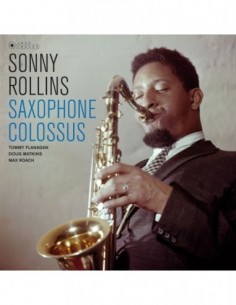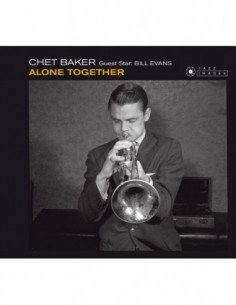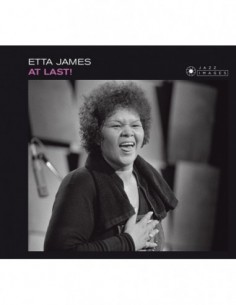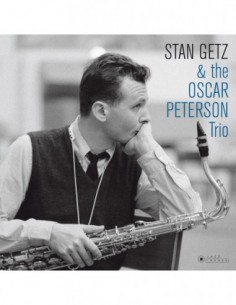Genius plus Soul equal Jazz
Ray Charles- Format
- LP
- Discs
- 1
- Label code
- 37046

Ray Charles
Ranked No. 10 of Rolling Stones magazine's all-time artists, Ray Charles is a milestone in the history of Rhythm and blues (R&B), soul, blues, country and gospel.
To have it in a personal collection is to give honor to the man who is also considered by the same magazine as the best male singer and the second best singer of all time, after Aretha Franklin. Jammie Foxx played him in the film Ray, released in 2004 and winner of two Oscars. Simply an unavoidable reference for any lover of the genre.
Although he liked to be called "Brother Ray", he was often referred to as "The Genius". And no wonder, Ray Charles (Hit the road Jack, 1961) lost his sight at the age of 7 due to glaucoma and, since then, developed an interest in music that led him years later to become the man who would forever change the destiny of black music, and one of the few people of African descent to win more than 10 Grammy Awards. Here is his story, his career, his musical legacy.
BIOGRAPHY
Ray Charles was born in Albany (Georgia) on September 23, 1930 and died in Beverly Hills (California) on June 10, 2004 from liver cancer. If there is one thing that defines his childhood, it is his own words: "I was born black, I was born poor, I was blind at the age of seven, and I couldn't save my younger brother, George, when he fell and drowned in a tub of laundry. I was paralyzed. Months later he was completely blind.
His mother, Aretha Robinson, moved with little Ray to Greenville (Florida) and it was right from there that he became interested in music. At the Florida School for the Deaf and Blind, where only whites were accepted, Ray Charles began to develop his musical abilities. At first he could only listen to classical music, and even learned to read and compose music in Braille. But when he learned about blues and jazz through the radio, his world changed.
His mother died and Ray was left alone in the world at the age of 15 with a prodigious musical ear, a lyrical baritone voice, a unique talent for the piano and a racial condition that made him a victim of the segregation of the American society of the time. However, his talent and his musical mastery, the combination of piano, keyboards, saxophone, synthesizers, were more powerful than his talent, and he rose to stardom in record time: his song "Baby, Let Me Hold Your Hand" reached the top positions in the music charts and years later he reached the number one position in the Billboard charts, with the song "Hit the Road Jack".
Ray Charles had a life of fame and glory, but also of shadows. He was considered a junkie addicted to sex and heroin, and was imprisoned for drug possession on three occasions. He overcame drugs after being admitted to a rehabilitation hospital and his passion for sex and voyeurism left him with twelve children by different women.
MUSICAL INFLUENCES
Ray Charles is one of the mythical musicians of R&B. His music, accompanied by a broken, fluid voice, sometimes tragic and sometimes sweet and intimate, forged a very effective musical style, influenced mainly by Nat King Cole, Louis Jordan and Charles Brown. Although he was criticized for using gospel in his songs, Ray Charles is known precisely for the perfect combination of genres: rhythm & blues, jazz, country, operetta, pop, rock and roll, swing, and gospel.
On the piano, Charles produced divergent styles: percussive, overlapping chords, smooth melodies, frenetic rhythms and cadences in his ballads. Many musicians consider him the father of soul and even Frank Sinatra himself exclaimed, "Ray is the only true genius in show business."
COLLABORATORS IN PERFORMANCE
In his initial band, Ray Charles had the opportunity to share the stage with Ruth Brown, David Newman (saxophone) and Joe Bridgewater (trumpet). This was just the beginning. Later he would collaborate with Milt Jackson (Soul Brothers), Betty Carter, Oscar Pettiford, Kenny Burrell or Billy Mitchell.
Among the most outstanding collaborations are: Ray Charles and Stevie Wonder; Willie Nelson and Ray Charles in the case of musical stages, and in the case of labels and producers, there is the millionaire duo composed by Ray Charles and Quincy Jones, considered the most powerful music producer of the 20th century.
To close with a flourish, Ray's musical career includes collaborations with Frank Sinatra and Ella Fitzgerald.
DISCOGRAPHY
Ray Charles Music's legacy is vast and sometimes unattainable.
Below is his discography by year of release:
1957: Ray Charlez (Album) (Oh, Hallelujah I Love Her So)
1957: The Great Ray Charles
1957: Yes Indeed!
1958: Ray Charles at Newport
1958: Soul Brothers (with Milt Jackson)
1958: Soul Meeting (with Milt Jackson)
1959: What'd I Say
1959: The Genius Sing the Blue of Ray Charles
1960: In Person
1960: Genius Hits the Road
1960: Dedicated to You
1961: Ray Charles and Betty Carter
1961: Genius + Soul = Jazz
1962: Modern Sounds in Country and Western Music
1962: Modern Sounds In Country and Western Music Volume Two
1963: Ingredients in a Recipe For Soul
1964: Sweet & Sour Tears
1964: Have A Smile With Me
1965: Live in Concert
1965: Together Again
1966: Crying Time
1966: Ray's Moods
1967: Invites You to Listen
1968: Portrait of Ray
1968: I'm All Yours Baby!
1969: Doing His Thing
1970: Love Country Style
1970: My Kind of Jazz
1971: Volcanic Action of My Soul
1972: A Message From the People
1972: Through the Eyes of Love
1972: Jazz Number II
1974: Come Live With Me
1975: Renaissance
1975: My Kind of Jazz, Part 3
1977: True to Life
1978: Love & Peace
1979: Ain't It So
1980: Brother Ray Is At It Again
1983: Wish You Were Here Tonight
1984: Do I Ever Cross Your Mind
1984: Friendship
1985: The Spirit of Christmas
1986: From the Pages of My Mind
1988: Just Between Us
1990: Would You Believe?
1993: My World
1996: Strong Love Affair
2002: Thanks For Bringing Love Around Again
2004: Genius Loves Company
2004: Genius & Friends
MOST FAMOUS SONG
Among his most emblematic productions we have: Ray Charles (America the beautiful), or Ray Charles - Georgia on my mind, or any single or album that can be found on Ray Charles Greatest Hit. Songs like "Confession Blues" (1949), "Mess Around" (1953), "What'd I say" (1959), "Hit the road Jack" (1961), "Here we go again" (2004) were part of important milestones in the career of one of the most important soul artists of the 20th century.
 Cookie preferences
Cookie preferences

















































